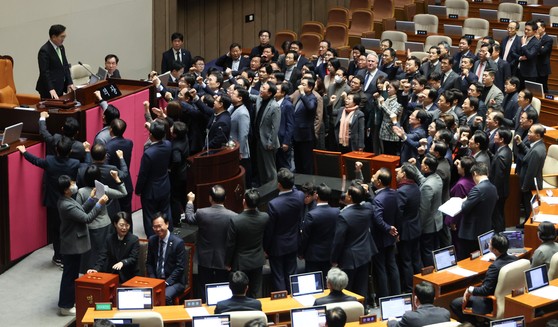Political turmoil in Korea deepened as the National Assembly passed an impeachment motion against acting President and Prime Minister Han Duck-soo on Friday afternoon, suspending the country’s second head of government in less than two weeks.
The move also marks the first time that an acting president has been suspended in modern Korean history.
The impeachment motion against Han, which accused him of acquiescing to President Yoon Suk Yeol’s short-lived declaration of martial law on Dec. 3 and other allegations, was supported by 192 of 192 lawmakers present in the 300-member National Assembly, where the liberal Democratic Party (DP) holds 170 seats.

Not one of the 108 lawmakers from the conservative People Power Party (PPP) participated in the vote on Friday.
The DP-dominated legislature impeached Han over the pleas of Deputy Prime Minister and Finance Minister Choi Sang-mok, who warned earlier the same day that the country’s “economy and external credibility must not be destabilized again after it just found its footing under the acting president’s governance.”
Choi is now the country’s acting president following Han’s suspension.
Han, who took over the reins of government after President Yoon Suk Yeol was impeached on Dec. 14, faced multiple warnings from the DP that he, too, could be impeached if he did not cooperate with the DP-controlled legislature.
The DP said it would allow him to act as a caretaker to minimize government disruption, but only so long as he did not obstruct their legislative efforts.
Under Han, however, the Cabinet repeatedly rejected or declined to consider several DP-backed bills, including legislation to establish special counsel probes into Yoon’s martial law order and corruption allegations against first lady Kim Keon Hee.
Han attributed his reluctance to pass the legislation to the lack of bipartisan consensus.
The DP’s patience with Han appears to have been finally exhausted by his announcement on Thursday that he would delay appointing the National Assembly’s nominees for the Constitutional Court, which will decide Yoon’s fate in the coming months.
Three seats on the court’s nine-member bench that are reserved for parliamentary nominees have been vacant since Oct. 17 due to gridlock between the DP and PPP.
Han cited the lack of bipartisan consensus in his decision to hold off on appointing the three nominees who were officially forwarded for his approval on Thursday. The PPP has argued that only the elected president should appoint justices to the Constitutional Court.
After National Assembly Speaker Woo Won-shik said the impeachment motion against Han could pass with support from only 151 lawmakers, his podium was surrounded by angry lawmakers from the conservative People Power Party (PPP), who called his decision an “abuse of authority” before walking out of the chamber.
While presidential impeachment requires the backing of two-thirds of lawmakers, a simple majority suffices to suspend Cabinet members.
The PPP argued that the higher standard should apply to an impeachment motion against an acting president, but that claim was called a misinterpretation by constitutional scholar Kim Ha-yeol in an interview with the JoongAng Ilbo on Thursday.
“If the acting president is impeached on account of their conduct as prime minister, the standard for impeaching Cabinet members applies, but the standard for presidential impeachment should apply if the cause for suspension arises during their tenure as acting president,” he said.
Both the DP and PPP have relied on Kim’s 2015 work, “Annotation of the Constitutional Court Act,” to advance clashing claims about how many lawmakers are required to impeach an acting president, though his book does not represent an official stance by the court.
The DP’s impeachment motion against Han cites multiple allegations against him stemming from both his time as Yoon’s prime minister and as acting president.
According to Kim, Han could argue before the Constitutional Court that the impeachment motion did not receive enough votes from lawmakers to pass, but his suspension from office would still apply unless the court found fault with the National Assembly’s proceedings.
BY MICHAEL LEE [lee.junhyuk@joongang.co.kr]




